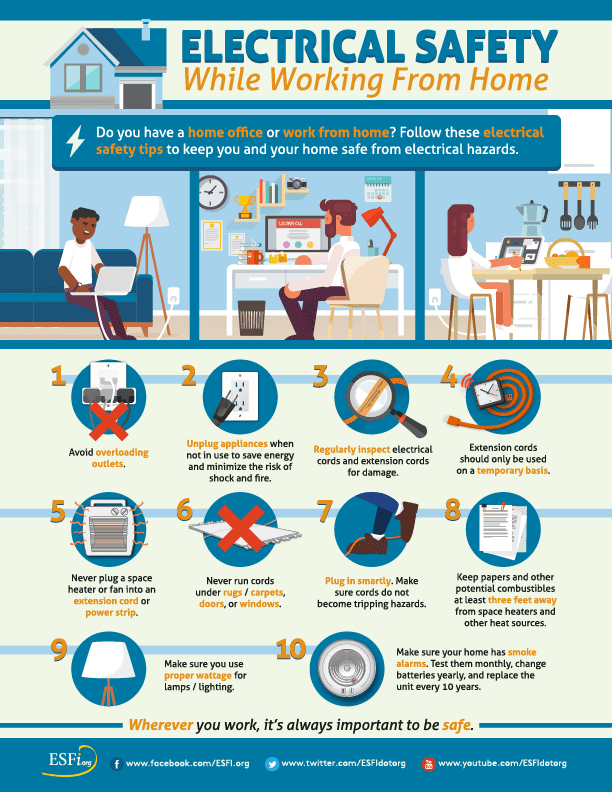If you are part of the growing crowd of people working from home, you need to understand the importance of electrical safety. Regardless of whether working from home is temporary, or it is a more permanent setup, here are a few tips for how to make electrical safety a priority:
Reference from ESFI.
- Do not overload electrical outlets because it could start a fire.
- When appliances are not being used, they should be unplugged to reduce energy use and to reduce the risks of fire and shock.
- You should routinely check extension cords and any electrical cords – including those powering appliances or electronics – for wear and damage. If you notice even a slight issue, then get rid of the cord and replace it promptly.
- If you are needing to plug in several things, get a power strip. Make sure you get an energy-saving power strip that is protected from power surges.
- Do not make using extension cords a habit. They should be used temporarily – and only as needed.
- Never use an extension cord or a power strip to plug in a fan or a space heater.
- You should never run electrical cords under carpets, rugs, windows, or doors.
- Remember water conducts electricity, so even a slight exposure could cause serious injuries. Make sure any spills are cleaned up right away, keep drinks and any liquids away from appliances and outlets, and make sure electrical outlets do not get wet.
- Be careful when you are plugging up appliances and electronics, and make sure you do not create tripping hazards.
- Any combustible products, such as papers, should be a minimum of three feet from any heat sources.
- Make sure all cords – whether being used or not – is kept tidy and stored so they do not suffer damage. Wrapping cords tightly around objects can stretch a cord or cause it to overheat. You do not want the cords to be accessed by children or pets where they could be chewed, pulled on, or damaged. Do not let a cord rest on a hot surface because it could damage the insulation and wiring inside the cord.
- Make sure all appliances are given enough room so air can circulate, and they do not run the risk of overheating. You should make sure electrical equipment or appliances are not used while in enclosed cabinets, and make sure any flammable materials are away from electronics and appliances.
- Check any exhaust fans to make sure they are clean, so they do not become a fire hazard. Some appliances, including computers, have exhaust fans and if the fan gets dirty or clogged up, the appliance will work harder, and its lifespan will shorten. It can cause overheating and build up gases and create a fire hazard.
- Check your lighting and lamps to make sure you use the proper wattage on any bulbs.
- You should check your home’s smoke alarms every month, put new batteries in each year, and replace the smoke alarms every 10 years.
Maintaining electrical safety should be given utmost importance regardless of where you are working. If you have any questions or concerns, speak with a licensed electrician in your area.
Reference links:

